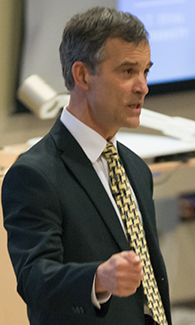Thursday, April 28, 2016
Missouri professor visits LUCOM for Biomedical Frontiers Seminar Series
Thu, 28 Apr 2016Shelley Andrews :: LUCOM Marketing and PR
They are two words that don’t appear to go together at first glance; art and science.
 “Some people get a little uncomfortable to think about science as an art,” said Brian F. Degenhardt, D.O., assistant vice president for research at Kirksville College of Osteopathic Medicine in Kirksville, Mo.
“Some people get a little uncomfortable to think about science as an art,” said Brian F. Degenhardt, D.O., assistant vice president for research at Kirksville College of Osteopathic Medicine in Kirksville, Mo.
At Liberty University College of Osteopathic Medicine (LUCOM) on April 21, Dr. Degenhardt explained how science and art have a lot in common. His presentation titled “Connecting the Arts of Science and Medicine” was part of the Biomedical Frontiers Seminar Series (BFSS) hosted by the LUCOM Center for Research.
“A lot of times in this world of evidence-based medicine, there is a feeling that the art of medicine is inferior to the science of medicine. That everything we do has to have a clear science or evidence base,” said Dr. Degenhardt. “The reality is, and any scientist will know, when we come to clinical practice, about 20 percent of what we do is science or evidence-based. The rest is art.”
To elaborate, Dr. Degenhardt cited one of the definitions of art: “A skill at doing one thing, typically one acquired through practice.”
“And when we talk about the definition of science, the simplest one is that it’s a way to ask and answer questions by making observations and doing experiments,” said Dr. Degenhardt.
Ultimately, practice makes perfect when improving any skill and Dr. Degenhardt believes this especially applies to the medical field.
“I didn’t realize until after 20 years of being involved in science, how much of an art it is. As a clinician, I’m constantly challenged by my patients, because what I’m reading in textbooks is not what is helping those patients at one point or another,” said Degenhardt.
Based off a conversation with a patient, Dr. Degenhardt studied the effect of Osteopathic Manipulative Medicine (OMM) on recurrent acute otitis media, or ear infections, in younger children. Compared to the control group, he says the children who received OMM experienced fewer ear infections and fewer surgeries. The research was published in the Archives of Pediatrics and Adolescent Medicine.
Looking more closely at osteopathic medicine, Dr. Degenhardt says the scientific process of asking questions and evaluating results is a core part of the profession. By viewing medicine through the lens of art, physicians are better able to treat a patient’s mind, body and spirit.
“We are challenged to ask deeper questions. Osteopathic physicians are really challenged to see their patients on a far more complex level than a typical clinician would be. Because we understand that both health and disease have manifestations, physically, mentally, emotionally and spiritually,” said Dr. Degenhardt.
“Dr. Degenhardt is a true clinician scientist, practicing both the art of osteopathic medicine and the art of science. As a leader in biomedical research focused on OMM, his contributions have great potential to enhance the training of future osteopathic physicians which, in turn, will improve the quality of patient care,” said Joseph W. Brewer, associate dean, LUCOM Center for Research.
Dr. Degenhardt’s presentation marked the final BFSS of the 2015-2016 year. Dr. Brewer calls the inaugural series “exciting” and is already planning next year’s schedule of speakers.
“We enjoyed cutting-edge talks on diverse topics including emerging infectious diseases, the role of genomics in diagnosis and treatment of devastating genetic conditions, mechanisms underlying substance abuse disorders, the relationship of spirituality and religion to human health, and OMM. We look forward to establishing a tradition of excellence in this seminar program as a service to LUCOM, LU and the Lynchburg community,” said Dr. Brewer.